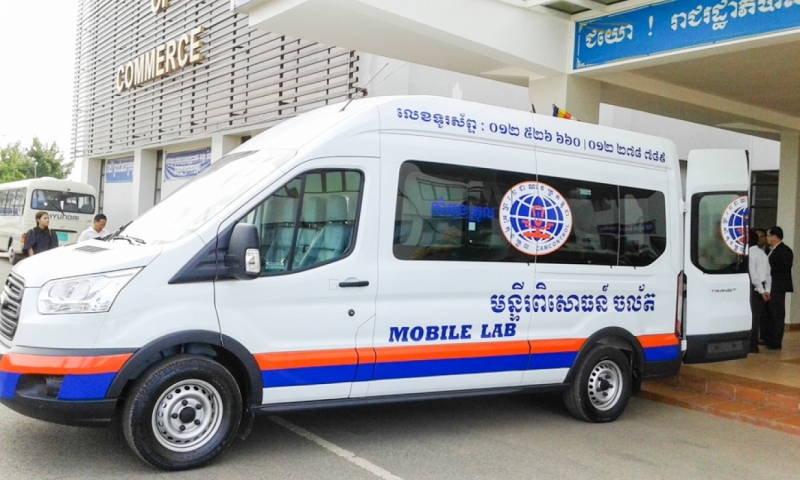




A mobile laboratory that will be able to analyze food samples at markets around the country was launched by the Ministry of Commerce yesterday, at the same time the ministry announced it was seeking Chinese support in building testing facilities at land borders to analyze imports.
Food scares in Cambodia are common. In September authorities intervened after formaldehyde-tainted prahok, or fermented fish, was discovered in Takeo province, while last month the government stressed that there was no evidence of plastic rice in the Kingdom.
In an effort to better protect the public from toxic food, and to allay fears, Commerce Minister Pan Sorasak said the mobile laboratory will boost CamControl officers in carrying out their important food safety role.
“The mobile lab will help officers to analyze the foods faster and allow the expert officers to take immediate action for out of date goods, bad quality goods and chemically-tainted products. The officers will confiscate those products on site and ban their sale in the market,” Mr. Sorasak said at the launch in Phnom Penh.
The lab will be capable of testing for pesticide contamination, livestock medicines, chemical additives such as borax and formalin and to check purity of such foods as cooking oil.
“The mobile lab will be available across the country, but in the beginning for our pilot we are focusing on Phnom Penh,” he said.
“We will also educate people in the markets to understand the problems of chemical contamination in food.
“Besides the mobile lab, the ministry is seeking support from China to build more mini-labs at border checkpoints,” he added, noting at present that only Sihanoukville Port, Poipet City and Bavet City checkpoints have testing facilities.
Mak Pichrith, the CamControl director-general, said the testing service would be provided free of charge and the public could request the mobile lab to visit their local market.
He added that upon the successful completion of the Phnom Penh project, each province would eventually receive its own mobile lab.
“We are the authority, so we will serve [the public] in their village and market,” he said.
“We think that people will be happy now that we have announced the mobile lab.”
According to state media AKP, the mobile lab is housed in a Ford Transit van and cost almost $120,000 to equip.
Sam Vitou, president of agricultural NGO Cedac, told Khmer Times that the launch of the mobile lab would be a great help in ensuring improved food safety in Cambodia, which relies heavily on food imports.
“The demand for fruit and vegetables imported from neighboring countries is about 80 percent [of total consumption] since Cambodia can only supply less than 30 percent of vegetables and fruit,” he said.
“Thus, when they find chemically-tainted vegetables or fruit and remove them from the market, will we have enough alternatives to meet demand?” he asked.
“We have to push increased local production to replace imports,” Mr. Vitou said.
Ieng Sotheara, the founder of Eco-Agri, stressed that with improved testing, the government must also strengthen laws on food safety, especially in ensuring that dangerous chemicals did not enter the food chain, ideally by pushing organic farming.
“The government should encourage local people to grow non-chemical vegetables and fruit and raise awareness of the impact of such chemicals to importers and producers,” Mr. Sotheara said.
According to a report by the Center for Policy Studies, some 400 tons of vegetables are estimated to be imported daily from neighboring countries, which can rise to 500 tons during festive seasons.